
Shehzad Bharwani and Adnan Merchant have helped start an incredible story; a story about the role Austin will play in FinTech. It was the fact that they have a story about the work they were doing as entrepreneurs – the experience Shehzad shared with me in transitioning his company, Dealytics, from New York to Austin, and the story of their passion for the meetup FinTech Austin – that inspired a talk I shared with the FinTech Austin meetup not long ago. It occurred to me, when they offered the opportunity to explore media, technology, venture capital, with finance innovators, that the best story to share might just be my story: A story that it’s our experiences that matter most, and that as founders, that the story you can tell is in fact the story most appealing to potential investors and reporters – two valuable relations (perhaps pivotally so) relationships.
In my work in venture capital and MediaTech Ventures, I’ve stumbled on to a reality of entrepreneurship that there is correlation between one’s engagement with venture capitalists and the media (the press). How is that the case and, more importantly, how do you uncover and tell your story? How does my own story of media, technology, and venture capital best help the FinTech industry (or any distinct industry) best? Well, let’s just tell it, or you can watch the video, and see how it goes.
Article Highlights
In a galaxy far, far away….
On Media and TechnologyWhat I want you to encourage you to think about, no matter what your venture, is the significance and importance of both media and technology with regard to venture capital. What most people don’t appreciate is that there is actually a very significant correlation between media and technology and venture capital. An old “friend” of mine who was substantial in the eighties, a man by the name of Peter Drucker who worked in FinTech (as it were), is famous for pointing out that the only thing that creates value in business is Marketing (i.e. Media) and Innovation (Technology). |
I started my career at Yahoo! and my entire life has been in media. What I’ve experienced in working in media, technology, startups, and with venture capital is a different way to think about how to talk to venture capitalists and how to talk to the press. When we’re talking to venture capitalists, we always talk about the famous 10 slide pitch deck – there is a problem and a solution and we’re going to solve it! if we just had the money to do that… We talk to the press by way of a press release, “Hey, I have an announcement! Would you please cover my announcement?”
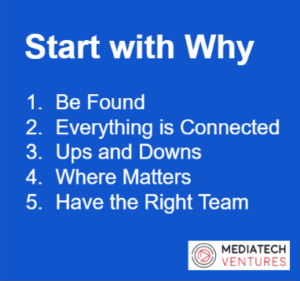
The reality is neither of those efforts actually work that well
Investors, at least in the venture capital community, generally don’t know about, care about, or understand your problem and your solution. Your job as an entrepreneur is to try and figure out how to make it relevant, make it meaningful – make it matter to the investment community. What we’re going to explore here is how five concepts distinguish an important set of talking points.
The problem/solution kind of narrative is really a rather simplistic way of fundraising. It’s a way to teach entrepreneurs – this is how you figure out what you’re doing with your startup – this is how you develop the talking points that matter to most people that might fund you. But at the end of the day, if you think about it… I really don’t care about your customer validation, I really don’t know or believe whether or not your solution is going to work… what I want to know is whether or not you are the person, whether or not you have the team, whether or not you have the experience to accomplish what it is that we’re talking about. Whether or not, if I give you $1,000,000, you’re going to be able to give me something back.
The beauty and the opportunity I had living in California for a bit, working for Yahoo!, is that I learned to appreciate very quickly that the venture capital community also doesn’t actually care about unicorns. We like to talk about “Unicorns!” Those are the solutions! “If we just had a few more big outcomes, in Austin, we might be able to aggregate more venture capital” No. That’s not what matters either. The challenge we have to overcome is that we need to learn to tell stories.
My Story
 Why am I talking about entrepreneurship in a somewhat different way than you typically hear? It’s because of my story. It’s because of my experiences. A good example of that experience is that like some, I grew up in the seventies and eighties. My first experience with film media was dominated by this kind of film; these characters. Star Wars.
Why am I talking about entrepreneurship in a somewhat different way than you typically hear? It’s because of my story. It’s because of my experiences. A good example of that experience is that like some, I grew up in the seventies and eighties. My first experience with film media was dominated by this kind of film; these characters. Star Wars.
The thesis I have, the idea I want you to come away with, is that each generation experiences media (film, music, print, news media, magazines) in very different ways. The experience we have with media as a child teaches us what we’re going to do in life. How we approach our profession. Our kids are again experiencing Star Wars, and such stories impact their lives and their future.
The way it does that, of course, is based on our experiences growing up. I grew up in Michigan.
In the seventies and eighties growing up in Michigan we had a bit of an economic challenge. The auto industry was struggling. There was a big pharmaceutical industry there that was dying. My father was witnessing local industries starting to outsource or relocate a lot of things. So we moved around a bit because the economy of that part of the world, at that time, was not terribly innovative. It didn’t really understand the narrative – the story – the WHY of Michigan in order to drive media attention, and economic development (jobs) and venture capital – something that Austin has been doing a pretty good job of for last 5 or 10 years. And before Austin, something that Silicon Valley did an exceptional job of.
The reason I’m so passionate about media is that, as you can tell, I like to talk/write. I started my career in radio – and I say started my career in that I’m talking about High School. I was one of those media tech kids that went and set up the film projectors. That was my nerdy thing. I was a DJ on the air for the high school radio station and I became passionate about music and the ability to use this medium to reach and influence a lot of folks. But of course, back in the eighties, that didn’t result in much opportunity in terms of a career. Right? We knew this internet thing was happening, we knew the computer was coming along.
Given my circumstances, until I was about 18, I plotted my path through life and it wasn’t that I was pessimistic, but if you think about kids today, wrestling with whether or not they should go to college (wrestling with whether or not they should afford to go to college – ‘is it worth it if there are no good jobs coming out of college anyway?’), we’re automating all the jobs out of existence… my experience growing up in Micigan was rather similar – What the hell am I going to do??
My plot was a downward curve
So I left.
I fled Michigan. Part of my story. In much the same way that many, moving to Austin in particular, are fleeing where they’re from.
Around the same time that Michael Dell started his company from his dorm, I started my first startup. You’ll never find that website. I didn’t do very well 😉
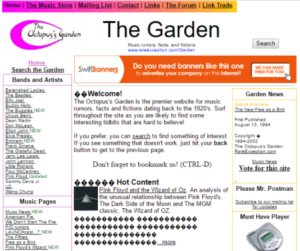 I went to Arizona State University and because I was that somewhat introverted media professional who was used to talking behind a microphone, I discovered the internet and I became fascinated. Here I am at ASU, the biggest party school in the country, for the too many years that I was there, and I found myself skipping parties to figure out what this website stuff was. To code. Around 1995.
I went to Arizona State University and because I was that somewhat introverted media professional who was used to talking behind a microphone, I discovered the internet and I became fascinated. Here I am at ASU, the biggest party school in the country, for the too many years that I was there, and I found myself skipping parties to figure out what this website stuff was. To code. Around 1995.
I took my past, my history, my experiences with music, my passion, and I built my own website – and this was back when it was just html and a text editor. Not terribly sexy a site (you can find one of my early articles, about Don McLean’s American Pie, archived here). But, it worked.
Keep in mind why I’m sharing with you my story. That that ugly website that didn’t result in any substantial business, as a startup, for me but it worked so well that it gave me the opportunity to learn all the different ways in which the internet was connecting people. I tried everything: banner exchanges, affiliate marketing, eCommerce, SEO (before that meant anything) – trying to figure out what this technology was doing but to me it was merely a hobby; it was just a way for me to explore this new form and medium.
My experience doing that is an important part of my story, and why I want you to think about the significance of this media and the role of technology in marketing is because of George Martin. Sir George Martin, the 5th Beatle. 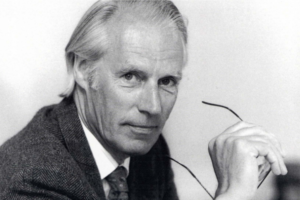 1996/1995, whatever it was, I get an email, “Found your website on the internet, very impressed, like that you’re talking about The Beatles. – Sir George.” (Or whatever it actually said, that asu.edu email address didn’t live on with me… and I don’t think he was “Sir” at that time).
1996/1995, whatever it was, I get an email, “Found your website on the internet, very impressed, like that you’re talking about The Beatles. – Sir George.” (Or whatever it actually said, that asu.edu email address didn’t live on with me… and I don’t think he was “Sir” at that time).
I’m flabbergasted. Initially, it didn’t even occur to me who it was. There was really no Google or Yahoo at this point, no way people were easily finding obscure websites outside of AOL’s keyword and those who knew what they were doing online, but I built something and because I built SOMETHING and put it out there, I get a note from the 5th Beatle from the other side of the world.
1. Be Found
One of the things you have to appreciate is that back in the eighties and nineties we were giving birth to the information age. And the fact of the matter of the information is that everything you put out there, all the pictures you take, is available to everyone. When you’re thinking about how you talk to the media, the way you approach the media, the role the media has in what you’re doing – when you think about how you validate what you’re doing for venture capitalists – you have to keep in mind that we can all look you up. The question is what we find – whether or not you can be found.
Do you have a presense anywhere, anywhere – you don’t have to build a website (are you on LinkedIN? Are you on Facebook? Are you on Twitter?)? If you don’t, you start off at a disadvange. Why? Because this is how the economy of our information age works.
If you’re a entprepreneur trying to raise capital who wants to pitch me and I’ve never heard of you, what am I going to do? What would everyone do? We’re going to look you up. If you don’t exist or there is no relevant background or history to be found, you start at a disadvantage.
The internet changed everything with regard to the simple idea that we can be found – we should be found – because your business can immediately be found on the other side of the world by someone like George Martin. Why would you prevent that from being possible?
I got recruited to Yahoo!
My first exit, as it were, was a result of my experiences. Back before Google, when it was a very neat place to work; I was there at a wonderful time when it was still rather startup-like. The Directory was the de facto definition of the way the internet worked. AOL, think about the history of the internet, enabled us to access the internet in an easy way, by way of a keyword. Yahoo’s claim to fame was enabling more access, not just a keyword but a directory – a database of everything online. Except it wasn’t everything online, was it? Yahoo built a business around the idea that we’re going to help people find what’s on the internet and they did a very good job of it for a time.
What the heck are we doing talking about Yahoo’s directory when my story is about media and film?? What happened to Star Wars?
I moved to Yahoo right when Broadcast.com was acquired out of Dallas. From a gentleman named Mark Cuban. I’m discovering at this point in my story that media is certainly no longer traditional – it’s no longer traditional film, radio, or print. That something else is happening herein. That Broadcast was a technology WAY before iTunes and Spotify streaming media in a way that few were conceiving of at that point. Yahoo saw that.
 You may not know George Martin but I hope with every fiber of my being that you recognize this guy. What was fun about my experiences with media and technology is that I got found again; this time thanks to Austin.
You may not know George Martin but I hope with every fiber of my being that you recognize this guy. What was fun about my experiences with media and technology is that I got found again; this time thanks to Austin.
What I learned being in an environment like that, then, in being in Yahoo at that time when everything we’re doing is in the news media and talked about (if you didn’t experience it, consider that Yahoo then was like Uber today – though with better cultural circumstances), was that exposure makes an immeasurable difference. I was then a Sales Engineer, the inside guy, for a rep by the name of Mike Murphy and my job at Yahoo was developing media (advertising media) for clients such as that which Mike had: Dell. My job was to develop the then largest online ad campaign for Dell.
What was fun about Yahoo, and my point about being found and the role that the internet plays in what you do today, is that at that time, at Yahoo nearly 20 years ago, the internet already had technology that could profile you, a visitor, without you telling us anything. We’re wrestling in today’s economy, particularly in Financial Technology, with things like privacy and security and profiling people… the ability to do that has been around for decades – appreciate what that means today: We are tracking and seeing everything about everybody because of the internet. So, it’s not a question of how to remain private, but how you take advantage of what it can mean for you.
Yahoo took advantage of it. Mike Murphy took advantage of it and we built and sold a substantial and effective media campaign that helped a computer company from Austin dominate the internet. As a thank you, I had the opportunity to go the Grammy’s and I had the pleasure of spending a brief moment with Paul McCartney who shook my hand. Now, I’m sure he was just being gracious but he remarked, “oh yeah, I’ve seen your website.”
The power of being found is in connecting and influencing your impact on the world. Even if he’d never actually seen my site, an opportunity was presented because of the effort to be there.
2. Everything is Connected
My outlook on life, my curve, had flipped from a grim and uncertain future to just the opposite. This was where the future was being uncovered, where our economy was thriving, and wherein to build a career. It’s in finding opportunity that we can develop, not a dire outcome, but that curve that’s up and to the right.
But that’s not a realistic expectation either, is it? Never is anything so grim nor likely the opposite: a positive logrithmic curve that might be the picture you want to paint for a potential investor. Enter Google.
Not only can you find some things via a directory but we believe that people should be able to find everything
Google set out to index the world’s information and make it available. That was their purpose. They had realized that the internet was making everything from websites to physical locations (maps) readily accessible but that meant that everything could (and should) be made available.
Consider how what Google was (is) doing flies in the face of the simplistic startup pitch advice. What you’re doing isn’t about a problem and the solution but rather the opportunity. The opportunity you create for a venture capitalist or journalist. Your solution to a problem is a press release but the story of the opportunity available is the cover of Wired Magazine. The reason investors want to have a conversation with you isn’t your solution but WHY – why you are, why you can, why anyone will care. Google came a long and essentially said BECAUSE of what AOL did, BECAUSE of what Yahoo did, and because of what the internet is doing, we know it’s possible to index absolutely everything – photos, videos, products, addresses, etc.
Creating a company like Google isn’t a result of a perceived problem that can be solved but the opportunity that is achievable. There was no problem needing a search engine (point of fact, there were many already I’m not bothering to elucidate) – Yahoo was very effective in what it was doing. Google didn’t set out with Adwords and, as we know, certainly didn’t sell the experience to users – customer validation wasn’t a matter of how they might make money but rather how to accomplish something more substantial on the shoulders of experiences that had come before – experiences both down (failured attempts and hard lessons) and up (the impact of Yahoo).
What AOL and then Yahoo and then Google showed us about our new economy is that everything is connected.
 Now, I didn’t make the career move to Google (oops!). Neither did I move where my peers moved – to Groupon, LinkedIn, Yelp, and Facebook.
Now, I didn’t make the career move to Google (oops!). Neither did I move where my peers moved – to Groupon, LinkedIn, Yelp, and Facebook.
Not a complaint, it’s part of the story as at that point in my life and career, I still hadn’t grasped my path. Still, what those moves in the industry showed us though is further validation that everything being connected is wherein businesses thrive today – appreciating that your startup is immediately online – found, considered, reviewed, and shared – requires that you change your perception of startup advice, validation, and growth. You are not limited to your neighborhood and peer group and building/behaving as though you are signals that don’t yet grasp the impliction of our new economy – a competitor who understands that and how everything is connected and available is the less risky investment.
3. Ups and Downs
My next experience found me at Hewlett-Packard, shortly after the acquisition of Compaq out of Houston (that’s three Texas cities now that keep drawing my attention).
When I moved from Yahoo! to HP, it was at the time when Hewlett-Packard was waking up to these new realities. I was pulled out of Yahoo and handed a small fortune to help HP figure out what to do online – analytics, email, affiliate marketing in the commerce business, dealing with search marketing, and yes, SEO.
Thanks to that move and the opportunities enabled by capital, I tested things, I got to speak, and I made a mark that became SEO’Brien. SE O’Brien had nothing to do with SEO but was an acknowledgement of both my experience with Search Engines and my interests as a Startup Entrepreneur – my future was being written as a result of my past, and a professional moniker that would unexpectedly serve to help me discern those who get it from those who don’t. You see, I don’t do SEO; or rather, my experience, time and again, has been that startup founders who don’t understand that SEO is a practice the company has to understand (and not something you can just hire out) – I get asked frequently if I “do SEO” and it’s a red flag that the person asking doesn’t appreciate that everything is connected and that affects how you and your venture are found.
At that time in the computing industry, with Dell having made the computer broadly available and Apple setting itself apart as a brand, yet another pivotal moment occured in my story – the greater appreciation of how important the media is to a company’s success. Hewlett-Packard successfully changed their story, investing to reinforce that the computer wasn’t a commodity or expensive Brand but rather a element of our lives as personal as anything. It was called the PC for a reason: the Personal Computer – during HP’s “The Computer is Personal Again” campaign, Hewlett-Packard showed how the computer and internet were resulting in the life we experience today – technology and our media intertwined so naturally that our photos, entertainment, videos, and more are personal experiences we have with our devices.
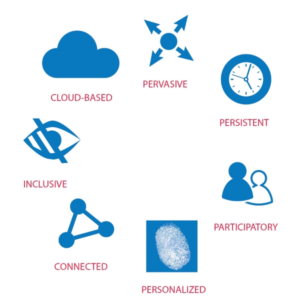 As our experience with media has moved from the computer into our pockets and smart homes, these discoveries from more than a decade ago are merely more applicable today. You must appreciate that engaging in media – be that in advertising, social media, content marketing, news, or simply running a website or mobile app – means understanding that ALL media and you’re effectiveness therein depends on embracing that it is pervasive, persistent, participatory, personalized, connected, inclusive, and cloud-based. What you do in any form of establishing yourself or your business in the world today depends on you investing your time, team, and capital in understanding and executing as such. Everything is connected, and if you want to be found, competitively, you must be pervasive, persistent, participatory, personalized, connected, inclusive, and cloud-based – or you lose your competitive advantage.
As our experience with media has moved from the computer into our pockets and smart homes, these discoveries from more than a decade ago are merely more applicable today. You must appreciate that engaging in media – be that in advertising, social media, content marketing, news, or simply running a website or mobile app – means understanding that ALL media and you’re effectiveness therein depends on embracing that it is pervasive, persistent, participatory, personalized, connected, inclusive, and cloud-based. What you do in any form of establishing yourself or your business in the world today depends on you investing your time, team, and capital in understanding and executing as such. Everything is connected, and if you want to be found, competitively, you must be pervasive, persistent, participatory, personalized, connected, inclusive, and cloud-based – or you lose your competitive advantage.
Think about it… if you are considering podcasting as a way of reaching an audience, the reality of today’s economy is that I can listen in any number of ways from being an iTunes subscriber to streaming your latest show via Facebook. I may give you my email address so you can send me updates but that likely gets filtered from my eyes and I’m still very likely to search for what I need and expect to read a bit about something before committing my time and attention to it – are you writing up your shows? I might prefer a mobile app for your show whereas my neighbor listens through Amazon Alexa. And thanks to Twitter, listeners are going to expect to be able to engage with you directly, have a chat and a personalized experience as a part of your brand and show – 24/7. The same is true if you are thinking about blogging, if you hope for your mobile app to been discovered above the fray, or if you want to be found in Google (SEO done in a silo is not the answer because everything is connected)…. and are you in for a shock? The same is true even if you aren’t online – an offline business or when considering radio, print, trade shows, or billboards, the world today is tracked, pervasive, and available.
Those are the new realities and thus the realities of our audiences expectations. You can opt to disregard those expectations and neglect a potential audience somewhere but doing so puts you at a competitive disadvantage and thus you need to appreciate how to be found, considering everything is connected, in order to avoid the future downturns that put your opportunity at risk – ups and downs are an expected part of your story and you want to convey that you’re increasingly overcoming the risk of downs.
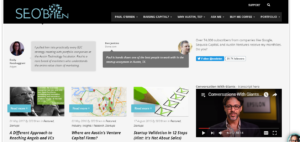 My own ups and downs drove me more aggressively into a data driven life and a professional outlook on life that is focused on the willingness to try, pivot, learn, analyze, optimize, and seek outcomes. That’s why I do the work that I do – that venture capitalists seek outcomes and outcomes are predicated on entrepreurs being able and willing to be found in a new economy wherein the landscape is constantly changing by way of those who can – you must figure out how to thrive in this new reality. What you see in my current online experience, my new website (this website) is that work in progress. My site today isn’t static but rather constantly changing based on data, accessible not just on different devices but in different channels, persistently and automatically promoting itself, and experimenting with the latest bots, bits, and bandwidth consumers to figure out HOW to promote not just my work but to understand how my partners and I can keep yours ahead of the curve.
My own ups and downs drove me more aggressively into a data driven life and a professional outlook on life that is focused on the willingness to try, pivot, learn, analyze, optimize, and seek outcomes. That’s why I do the work that I do – that venture capitalists seek outcomes and outcomes are predicated on entrepreurs being able and willing to be found in a new economy wherein the landscape is constantly changing by way of those who can – you must figure out how to thrive in this new reality. What you see in my current online experience, my new website (this website) is that work in progress. My site today isn’t static but rather constantly changing based on data, accessible not just on different devices but in different channels, persistently and automatically promoting itself, and experimenting with the latest bots, bits, and bandwidth consumers to figure out HOW to promote not just my work but to understand how my partners and I can keep yours ahead of the curve.
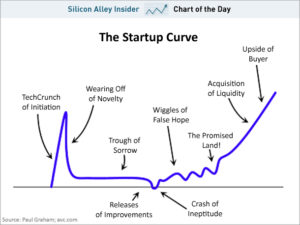 In my story, it’s here, where the experiences of my brother and sister (working in Wall Street and Nursing respectively) that life’s realities dawned on me. That your story has ups and downs. That your experience and the opportunity you present had better look like a stock market indices as nothing goes through life without learning from past struggles, pivoting, excelling, and uncovering opportunities that will continue to do the same up and down dance; hopefully, without the downward slope. Life’s EKG is a series of ups and downs that validate that you are a part of this life you’re living, your startup, and failing to be genuine about the realities of life raises a question of whether or not you’re being honest with yourself, or simply don’t know what’s actually going on – neither are fundable opportunities. Don’t lose credibility by conveying everything is up and to the right when the very nature of entrepreneurship is exploring the riskier opportunities to uncover innovation. You’re seeking investment so as to work through those challenges and investors, like journalists, prefer hearing about, and being confident that, you are passionate about and capable of working through them.
In my story, it’s here, where the experiences of my brother and sister (working in Wall Street and Nursing respectively) that life’s realities dawned on me. That your story has ups and downs. That your experience and the opportunity you present had better look like a stock market indices as nothing goes through life without learning from past struggles, pivoting, excelling, and uncovering opportunities that will continue to do the same up and down dance; hopefully, without the downward slope. Life’s EKG is a series of ups and downs that validate that you are a part of this life you’re living, your startup, and failing to be genuine about the realities of life raises a question of whether or not you’re being honest with yourself, or simply don’t know what’s actually going on – neither are fundable opportunities. Don’t lose credibility by conveying everything is up and to the right when the very nature of entrepreneurship is exploring the riskier opportunities to uncover innovation. You’re seeking investment so as to work through those challenges and investors, like journalists, prefer hearing about, and being confident that, you are passionate about and capable of working through them.
4. Where Matters
Are you not passionate for what you’re doing? In what line of work is that? Wherein are you working?
From HP and SEO’Brien, I was pulled into launching startups and experienced a great series of ventures in accounting, local events, payments, eCommerce, and social data. My reason for leaving HP for the life of an entrepreneur is that my daughter was born and I looked at what I was teaching her working 60 hours a week for a big company, and traveling a bit, and thought this is not the life I’d want her to live. My passion and commitment for my work, for where I work, are as much a part of my story as anything else.
In engaging with potential cofounders, essentially getting married professionally, you’re settling in to where you’re story will go, in sickness and in health, for richer or for poorer. No? Is your success as an entrepreneur not heavily dependent upon partners and cofounders? Is the business not at great risk if you and your team aren’t on the same page and in sync about where you’re going, what everyone expects, and how to deal with the tough times?
Where Matters. After a few years of working with startups and the Silicon Valley venture capital community, my youngest was born, the mortgage crisis hit, and cancer knocked at my door. Ups and Downs. Keep in mind I have midwest roots in the epicenter of innovation and life just threw me a series of downs… where was no longer a matter of the work I was doing but literally where I wanted to be in doing it.
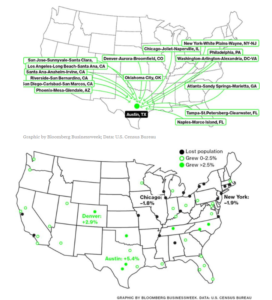 Yahoo, Broadcast.com, and a thriving economy, some years ago mind you, turned our attention to Dallas. We had ties in Houston thanks to HP/Compaq and some family but when you think, as we did, about where you want to be, professional opportunity weighs heavily on your decision. Are there jobs? Is the industry in which I work thriving there?
Yahoo, Broadcast.com, and a thriving economy, some years ago mind you, turned our attention to Dallas. We had ties in Houston thanks to HP/Compaq and some family but when you think, as we did, about where you want to be, professional opportunity weighs heavily on your decision. Are there jobs? Is the industry in which I work thriving there?
Interestingly, big companies and working professionals put foremost that question, but the entreprenuerial, can do spirit of startup founders tends to overlook how important it is that you’re doing what you’re doing WHERE it’s most likely to succeed. Rarely do pitch decks and opportunities convey how the experiences and assets of a region of the world are ideally suited to the company being built. Of course, in a commonplace business venture that question might not be as pertinent but is funding an AgTech venture based in Manhattan not a bit riskier than the one in Fort Worth or Oaklahoma City? Search Engines are built in Palo Alto, CA whereas a place like Austin is flush with eCommerce industry experience, platforms, and companies. Where Matters.
As we looked to Dallas as an ideal place professionally, Austin caught our attention because of SXSW’s work in Interactive, my interest in music and radio, and it being centrally located to the region of Texan Startups.
There is a reason so many people are coming to Austin, and Dallas, and Houston, and San Antonio. There is a reason so many are coming from N. California. It’s part of our story, an important part, as it’s part of your story of why you are here and how you can create an opportunity for investors by way of Austin.
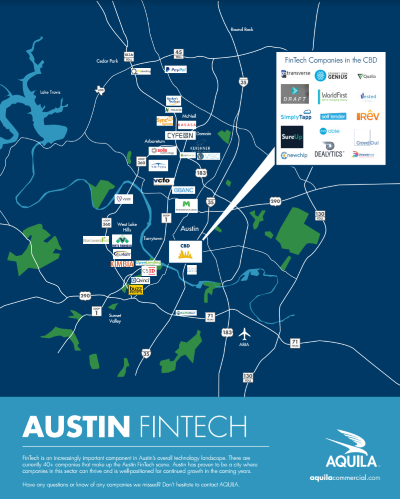 Shehzad Bharwani is here, from New York, and in a matter of months the FinTech Austin group has exploded in size. Think about that as frankly, I’d not consider Austin an epicenter of financial innovation. New York and Boston, Dallas strikes me before Austin, but there is a history and story to Austin that the entrepreneurs to whom I spoke, during the FinTech Austin meetup, know that explains why they are here.
Shehzad Bharwani is here, from New York, and in a matter of months the FinTech Austin group has exploded in size. Think about that as frankly, I’d not consider Austin an epicenter of financial innovation. New York and Boston, Dallas strikes me before Austin, but there is a history and story to Austin that the entrepreneurs to whom I spoke, during the FinTech Austin meetup, know that explains why they are here.
I had a chat with Aquila Commercial’s Matt Wilhite shortly after this talk. Throughout the years I’ve put together various thoughts on the regions of Austin and how entrepreneurs benefit from working where in town they can best connect with what they need; so I have an odd passion for helping the commercial real estate sector of Austin distinguish parts of town so they can better move tangible assets (buildings) and capital through entrepreneurs and companies more likely to benefit not just from finding a space but finding a space where they’re likely to thrive. Just so happens Matt and the team were looking at the FinTech community and put together this infographic that helps make my point…
There’s a story there, of how, why, and WHERE Austin FinTech is thriving. Perhaps not coincidentally, it happens to be regionally located where startups are more likely to reach venture capital investors.
5. Have the Right Team
Why does where matter? Because your team matters most. Both as part of the story to tell and because at the end of the day a team of the right people can accomplish anything, the key to your success is surrounding yourself, geographically, by those who best support what you’re doing.
The story that the media wants to tell and frankly the stories that the venture capitalists need us to tell are stories about the right people in the right places. What is the role of a venture capital firm? It’s actually to RAISE money so that you have money. If a venture capitalist can’t do that, perhaps because we’re not exposing and telling and exploring these wonderful narratives about WHY AUSTIN and what’s going on here, they’re going to have a hard time raising money too, no? That funding will pool where it’s known to deliver returns – generally a result of the right teams in places where what they’re doing is likely to thrive.
Austin is starting to figure out that how to convey what’s amazing about what’s going on here, macro-economically, and that’s critical for us all as those distinctions of where we are help establish why investors, and companies, and experienced mentors, and talent, and ideas, in that context, are more likely to succeed here than elsewhere. Look at what’s happening in FinTech… look at what’s being uncovered and developed in MediaTech because of the convergence in Austin of film and music and video games and advertising… notice the distinct opportunity in eCommerce in Austin… There is something going on in Austin that is not the same as elsewhere – a single fundable startup is a press release or distinct investment opportunity whereas an industry of innovation is journalists theme and a hub for private equity and venture capital.
How do you add WHY you’re here, the industry in which you work, and where you’ve been to your narrative as it substantiates an intentional, experienced, and collective opportunity for investors, or a story rather than a press release for a reporter.
A New Hope
 That story, the story that defines so many of our experiences growing up and inspiring what we do, best shows us the kind of impact exploring your own venture this way can have.
That story, the story that defines so many of our experiences growing up and inspiring what we do, best shows us the kind of impact exploring your own venture this way can have.
What is Austin but A New Hope for many? An opportunity to rebel against the Empire of the way things have always been done. The story of Austin is reinventing the economy as Austin’s community – where we are – is passionate about bringing established technology to traditional industries, fostering smart cities, addressing diversity head on, develop social impact oriented business, freelancing, and forging new ways in which to fund and finance businesses.
We’re all coming to Austin from different parts of the world, saying, “eh… what was there is not what we want, it’s not what we’re looking for. That’s not the way in which we’d like to wok in the future.” We’re coming to Austin with an amazing colletion of experiences, from the coasts – think about that. It’s not that just N. California is coming here, LA is moving here, New York is moving here, Chicago is moving here, and those are hubs of industry from which people are seeking a new hope.
Why am I passionate about MediaTech by way of Austin? A great percentage of those people coming out of Silicon Valley, New York, and LA, are coming out of their respective media industries (advertising, news media, social media, music, film and video), and rather than doing “media” the way we used to, having to get a film produced by the film industry, as it were, or having an agency or label produce a music album, we, here, can figure out how to make that work in the new economy.
It’s IV in particular that’s notable to appreciating our opportunity. That film was distinct and influential in it’s own right, in this context, because what mattered most was the team that took on the Empire to change the galaxy. And that’s the opportunity in Austin today; that people are coming from the far reaches of the galaxy ceate teams of people.
Star Wars with Luke, the passionate startup founder with a dream, a purpose, and an opportunity to bring balance to the force, connects with Old Ben, his advisor, because he has positioned himself to be found. Ben teaches him how about the struggles of the past, the downs, the triumps, the ups, supporting that Luke’s own ups and downs aren’t unusual but part of what gives him strength. They set out to find their technical cofounder, knowing that they aren’t getting anywhere without the fastest ship in the galaxy; recognizing that they can’t be successful staying where they are. Ben reveals how everything is connected and how their intuition, experience, and being open to what’s being revealed to them is critical to their success. Their first stop? Securing their CMO, Leia, who has the plan and understanding of the industry, how things work, and who the players are. With that team, that ideal startup, they bring an opportunity to their partners, the Rebellion, to disrupt everything.
The CEO, the CTO, the CMO, and the advisor, from different experiences but a shared purpose. That film alone showed how we might tell our own story in such a way that it’s as appealing to the public, fascinating to storytellers, and validated for investors and we should be doing that, not only as distinct startups, but the galaxy of Austin.
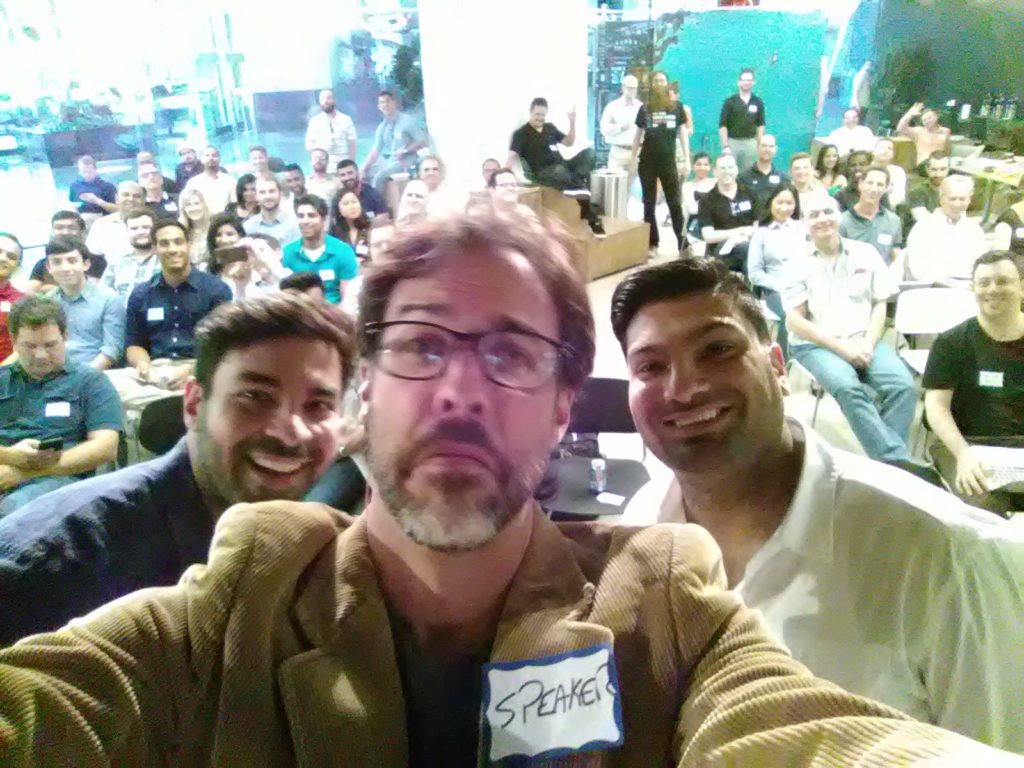



100%. Go get em O’Brien
Thanks Paul, we had a blast working with you!
I love this. And (shameless plug) an experienced storyteller can help you articulate your vision and your ASK.
no need for thinking of it as plugging Christopher! You’re exactly right and it’s not just “can help you” but it should essentially be said that such a perspective and experience is required – if you hope to secure funding. In my 15 years working with startups – those that consider their CMO one of the key leaders and founders have always gotten funding. Those that consider Marketing merely lead gen or a line item in the budget tend to fail.
Thank you for reminding everyone that the way to do this effectively is by doing it with those who know how.